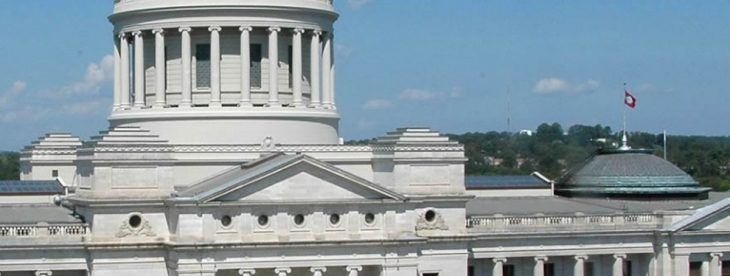Panel advances Arkansas school choice bill; administrators opposed
by March 9, 2017 7:03 pm 669 views

The House Education Committee advanced a bill Thursday (Mar. 9) that would allow Arkansas individuals and corporations to receive a tax credit for donating to nonprofits that fund school choice options, including for private and home schools.
House Bill 1122, the Arkansas Parental Empowerment for Education Choice Act of 2017, by Rep. Jim Dotson, R-Bentonville, would provide a 65% tax credit for individuals and corporations that donate to nonprofit organizations. The donations would fund education savings accounts in amounts equal to public school foundation funding (which was $6,646 in 2016-17) for students to attend public, charter, private or home schools.
The donations would go first to students whose family incomes qualify them for free and reduced price lunches, followed by military dependents and then other students. Nonprofits could use tax-credited donations only for educational expenses and would have to raise money for administrative expenses elsewhere. Up to $10 million could be donated to up to five nonprofits starting in fiscal year 2019, with donations able to grow 10% a year. Each public school district’s student losses would be capped at 1% a year per nonprofit, meaning a district could lose 5% of its students each year.
The bill first passed on a voice vote and then passed in a roll call 12-4 with four not voting. The vote followed two hours of discussion and debate, including 12 speakers from the audience. Many others were signed up to speak but did not have a chance to do so.
Pressed by Rep. John Walker, D-Little Rock, if the bill was a voucher bill, Dotson described it as an “education savings account bill.” Instead of the state providing tax dollars to a private or home school, students would use donated private funds that were incentivized by the tax credit. Dotson said the bill gives parents flexibility to use the money as they see fit for tuition, assessments, tutoring and other expenses. Students could save money for college expenses, though no new funds would be available after high school.
The impact on the state budget would be $6.5 million the first year and up to 10% more each year thereafter, said Joel DiPippa with the Department of Finance and Administration, leading Rep. Mark McElroy, D-Tillar, who voted no, to ask, “If we’re not using public funds for private schools, how come our money’s going down?” Rep. Stephen Meeks, R-Greenbrier, later pointed out that legislators continue to increase funding for public schools and that $6.5 million is a very small percentage of the overall school budget.
Dale Query, executive director-elect of the Arkansas Rural Education Association and a retired superintendent, said research has shown vouchers do not improve student achievement but can produce “stratification” where the private school eases them out. He argued that private schools do not face the same accountability measures as public schools.
But Dr. Patrick Wolf, a distinguished professor of education policy at the University of Arkansas, said the model produces shared accountability, involving parents who can customize their children’s education. He said private school choice programs have stretched across the country and research has shown students who participate in them have higher test scores and are more likely to graduate high school and attend college, and that 30 studies have shown private school choice saves money.
“The bottom line is that it’s less expensive for government to educate students in the private sector through choice programs than it is to educate the same student in the public sector through the funding formula mechanisms,” he said.
Dr. Richard Abernathy, executive director of the Arkansas Educational Administrators Association, said the model would remove money from public schools and could eventually lead to more consolidation. He questioned if legislators should create similar accounts for parks, where instead of shared community facilities citizens would be given money to buy memberships in private clubs.
The bill does not address the admittance policies of the educational providers receiving the funds. Andrew Bagley, president of the Helena-West Helena School Board, said the private schools in his area had been formed in order to maintain segregated schools and that one local private school had never admitted a minority student. He said his district was working hard and has seen improvement.
“Do we want to open this door and further make it difficult through less resources for us to do an already difficult job?” he asked.
Virginia Ford, a school choice activist, said her son was failing in one school, but when given a scholarship to another school, he had a total change in his behavior and achievement level.
She said she talked to parents across the country, and, “The conversation is always the same. How can I be a part of my child’s education? What can I do to make sure I’m giving my child everything he needs? And resources are very important for those families. They need to be able to have the money to do that, and this bill really addresses that.”
